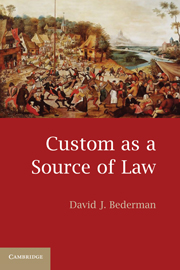
-
Select format
-
- Publisher:
- Cambridge University Press
- Publication date:
- June 2012
- August 2010
- ISBN:
- 9780511781971
- 9780521897044
- 9780521721820
- Dimensions:
- (228 x 152 mm)
- Weight & Pages:
- 0.55kg, 284 Pages
- Dimensions:
- (228 x 152 mm)
- Weight & Pages:
- 0.46kg, 288 Pages
- Subjects:
- Law, Jurisprudence
Book description
A central puzzle in jurisprudence has been the role of custom in law. Custom is simply the practices and usages of distinctive communities. But are such customs legally binding? Can custom be law, even before it is recognized by authoritative legislation or precedent? And, assuming that custom is a source of law, what are its constituent elements? Is proof of a consistent and long-standing practice sufficient, or must there be an extra ingredient - that the usage is pursued out of a sense of legal obligation, or, at least, that the custom is reasonable and efficacious? And, most tantalizing of all, is custom a source of law that we should embrace in modern, sophisticated legal systems, or is the notion of law from below outdated, or even dangerous, today? This volume answers these questions through a rigorous multidisciplinary, historical, and comparative approach, offering a fresh perspective on custom's enduring place in both domestic and international law.
Reviews
"In comparing these diverse areas of law, this rich study draws on an impressive array of methodologies and disciplines, including anthropology, history, psychology, and economics. Although Professor Bederman’s vision of custom is familiar in many ways — he adheres to the traditional view that custom involves both objective and subjective components — his contribution is nonetheless significant in its delineation of the jurisprudential and practical factors that explain custom’s staying power."
- Harvard Law Review
Contents
Metrics
Altmetric attention score
Full text views
Full text views help Loading metrics...
Loading metrics...
* Views captured on Cambridge Core between #date#. This data will be updated every 24 hours.
Usage data cannot currently be displayed.
Accessibility standard: Unknown
Why this information is here
This section outlines the accessibility features of this content - including support for screen readers, full keyboard navigation and high-contrast display options. This may not be relevant for you.
Accessibility Information
Accessibility compliance for the PDF of this book is currently unknown and may be updated in the future.


